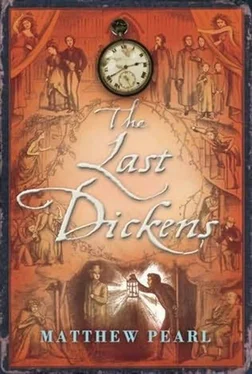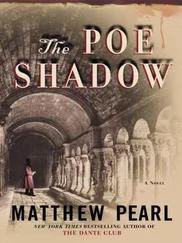For a few more seconds, Osgood kept dismissing the idea that these two men were as threatening as they appeared. Telling himself to be rational, he decided to perform a test. As he rose to his feet slowly, they both paused, looked at each other, then resumed their paths toward him more aggressively, like two ends of a vise. The stocky onlooker was no longer hiding his gaze. Meanwhile, Osgood was penned in everywhere else by the immense population of Dickensites packed in the room.
Then a hand was on Osgood's shoulder.
“Beg pardon,” Osgood said in firm protest. “Is there something wrong, sir?”
“We'd like to take you upstairs,” the stocky man replied.
“Who are you?” asked Osgood. “I insist on knowing what you gentlemen want before I go with you.”
Giving no reply, the man pulled Osgood up by the arm and began to drag him toward the exit behind the auctioneer.
Osgood threw his hand up.
“Do you bid, sir?” Woods asked Osgood, clearing his throat nervously.
The auctioneer's assistant was holding up a sad little salt cellar that had thus far attracted little notice. “Ten shillings value, sir,” Woods said.
“What bid are we at?” Osgood asked loudly.
“Nine shillings, sir.”
“Ten guineas,” Osgood said, then raised his own bid: “Ten and a half!”
The crowd gasped at the remarkable amount for the salt dish. This suggested that the rest of the crowd had overlooked its worth, and other bids bounced around the auction hall until Osgood finished at eighteen and a half guineas. The spectators exploded into cheers to commemorate the extravagant purchase. Osgood threw his hat into the air. This sent the audience into paroxysms of excitement and everyone around the room stood and applauded. In the meantime, he used the attention and the confusion to slide from the man's grasp.
But the man was behind him in a flash and the crowd was still too thick to get around.
In a remarkable deliverance, before he knew what had happened, Osgood was hoisted on two men's shoulders. Wriggling off of them, he nearly tumbled right over the head of the other pursuer while desperately clutching his newly purchased glass tazza. Osgood balanced the tazza safely under his arm and ran, escaping the crowd only to lose his balance, tripping as he crossed over the threshold into the anteroom. The tazza went flying.
“No!” Osgood cried, caught in the helpless moment of waiting for it to shatter.
A man stepped out of the shadows and caught the tazza before it could hit the floor.
Osgood exhaled in relief. The tazza had survived. The man who looked up from underneath his wide-brimmed hat had intelligent, dashing eyes. A floppy purple flower leaned out from his buttonhole.
“They're still behind you!” he said. “Follow me.”

HIS RESCUER LED OSGOOD THROUGH A BACK CORRIDOR OF Christie's into a basement and out the street door. The two men came out into a small lane that led them into the cover of the boisterous London crowds.
“Whatever did you do to make them so keenly interested in you?” asked the man, after they looked around and decided they had not been followed.
“I honestly don't know,” Osgood answered. “I inquired to the auctioneer about that item they had left out-item eighty-five. It's here in the catalog. I had noticed it at Gadshill that day you were there-I even saw it being wrapped up by the auction workers the next day.” Osgood handed him the catalog.
The man nodded as they walked across the busy square of brick and mortar buildings. Every passerby in London, even the poorest newsboy, had a flower in his coat, though no one else boasted an opium poppy. “If you saw this plaster statue taken out of the house, and it was printed in the catalog, we know it made it to the auction rooms. Why would they skip over it, then? There is only one strong likelihood to suspect. That it was stolen from Christie's rooms after the catalog was printed but without enough time to correct it-shortly before the one o'clock auction, then. That explains why they were after you.”
“Do you mean they thought I was the one who stole the statue?” Osgood exclaimed.
“Unlikely enough! But you were calling attention to the fact it was missing. Think of it through their eyes. If a theft from Christie's auction house were to be reported in the papers, all the finest dealers in London would hear of it. They'd note, too, that it occurred from a prize sale like Dickens's. How many customers would be lost to rival auction houses?”
Osgood thought it over. He recalled that Mr. Wakefield from the Samaria had mentioned using Christie's for his tea business and decided he would write to Wakefield asking him to inquire into what had happened to the statue. For now, Osgood studied the steady gait and bearing of the man who had acted so unaccountably strange in the chalet at Gadshill.
“I have wanted to speak to you, sir,” Osgood said cautiously.
“I know it,” said his walking companion without breaking stride.
“You do?”
“You have looked for me at the Abbey.”
“You saw us going back there then? You have been following us!” Osgood exclaimed.
“No, this is without making the least investigation. There is much to know by simply opening the eyes, though, my friend.”
“How then?” Osgood asked, genuinely curious but also as a test of the man's sanity.
“First, I saw you keenly interested in my flower when we were both at Poets’ Corner together.”
“The opium poppy.”
He nodded. “Then, on another day, I had seen that one of my flowers had been removed. I surmised it was likely the same person who observed it attentively on the first occasion: you.”
“I suppose that makes some sense.”
“Have you received any responses about me from your letters to the mesmerism experts?”
“What?” Osgood's jaw dropped. “But I left my bookkeeper at the inn writing those letters of inquiry as we speak! I instructed her to do this only this morning, thinking that without Mr. Dickens you may have sought those services elsewhere. How did you possibly know about that?”
“Oh, I didn't! I merely surmised it as well, which is a rather more convenient way of obtaining information than actually knowing it.”
Osgood was impressed. “Have you seen another mesmerist?”
“Mr. Dickens cured me quite thoroughly. I have no need.”
“Sir, I owe you my thanks today for what transpired at the auction house. My name is James Ripley Osgood.”
The man turned toward the publisher with a military air. His lank white hair was combed with perfect care this time, although his clothes were disheveled and loose. His sun-scarred features were handsome, large and chiseled. It did not surprise Osgood that Dickens would have accepted the farmer into his home-his pride in helping the working poor had been almost as strong as his pride in his writing, for he remembered his own humble childhood.
“I fancy you are ready, Ripley,” the man said with an enigmatic, crooked-toothed smile upon adopting an immediate nickname for the publisher.
“You said the same thing at the chalet. But ready for what?”
“Why, to find the truth about Edwin Drood.”
Osgood took care not to show excitement or even surprise at the startling pronouncement. “May I take the liberty of having your name, sir?” Osgood replied.
“I apologize-I was in one of my unnatural spells when you saw me at Gadshill and not acting right. I did not present myself. What you must think!” He shook his head in self-recrimination. “My name is Dick Datchery. Now that you know who I am, we may talk openly.”
Читать дальше













